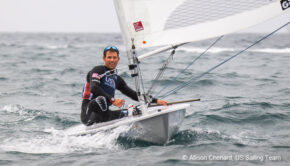Changing the world isn’t so simple
Published on September 22nd, 2021
by Craig Leweck, Scuttlebutt Sailing News
At the risk of appearing insensitive, I do struggle with the transgender women and sport. Gender-based competition exists to provide level competition for men and women, which for Sailing began at the Seoul 1988 Olympics. It allowed women to have their own stage, to have their own aspirations.
The International Olympic Committee has pushed the initiative ever since, converting open events to either gender-based or mixed. The knock-on effect is now the IOC can account for the gender balance, and proudly state how Paris 2024 will be the first games with both equal medals and participation for each gender.
It has been a goal for the IOC to stimulate women’s participation and involvement in sport by creating more participation opportunities at the Olympic Games. More so, as stated in the IOC’s Olympic Agenda 2020 doctrine, they repeat the words of Nelson Mandela of how “sport has the power to change the world.”
But changing the world for women isn’t so simple amid the issue of transgender athletes as detailed in this report by The Guardian:
The International Olympic Committee’s new transgender guidelines for sports have been delayed again because of “very conflicting opinions” and are now unlikely to be published until after next February’s Beijing Winter Olympics, three years later than originally planned.
The news was revealed by the IOC’s science and medical director, Dr Richard Budgett, who said the forthcoming advice for international sports federations would “prioritise inclusion” and “avoidance of harm”.
As things stand, the IOC suggests trans women should be allowed to compete in the women’s category if they reduce their testosterone for 12 months – although individual sports federations are allowed to come up with their own rules.
However, speaking to a Council of Europe conference on protecting and promoting the human rights of intersex and transgender athletes in sport competitions, Budgett said the IOC’s approach would shift. “There’ll be broad high-level guidelines – more like a framework,” he said. “It’s the international federations who will determine the specific rules for their sports and their events.
“The particular changes from 2015 are the emphasis on the priority of inclusion, and on the avoidance of harm, but always bearing in mind the importance of fair and meaningful competition. We still have to agree on the framework. It’s challenging. But it will be published in a few months’ time – at the latest just after the Beijing Olympic Winter Games.
“We’re very aware that sex, of course, is not binary. It’s a continuum. The sectors overlap. And so the solutions are not essentially going to be binary.” – Full report
Standing by for how Sailing will choose its specific rules, and more so, how they intend to administer them at all levels.









 We’ll keep your information safe.
We’ll keep your information safe.